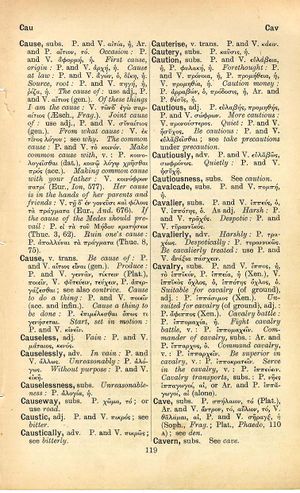cause
Ὁ μὴ γαμῶν ἄνθρωπος οὐκ ἔχει κακά → Multis malis caret ille, qui uxorem haud habet → Der Mann, der ledig bleibt, kennt keinen Leidensdruck
English > Greek (Woodhouse)
substantive
P. and V. αἰτία, ἡ, Ar. and P. αἴτιον, τό.
occasion: P. and V. ἀφορμή, ἡ.
first cause, origin: P. and V. ἀρχή, ἡ.
cause at law: P. and V. ἀγών, ὁ, δίκη, ἡ.
source, root: P. and V. πηγή, ἡ, ῥίζα, ἡ.
the cause of: use adj., P. and V. αἴτιος (gen.).
of these things I am the cause: V. τῶνδ' ἐγὼ παραίτιος (Aesch., Fragment).
joint cause of: use adj.: P. and V. συναίτιος (gen.).
from what cause: V. ἐκ τίνος λόγου; see why.
the common cause: P. and V. τὸ κοινόν.
make common cause with, v.: P. κοινολογεῖσθαι (dat.), κοινῷ λόγῳ χρῆσθαι πρός (acc.).
making common cause with your father: V. κοινόφρων πατρί (Eur., Ion, 577).
her cause is in the hands of her parents and friends: V. τῇ δ' ἐν γονεῦσι καὶ φίλοις τὰ πράγματα (Eur., Andromache 676).
if the cause of the Medes should prevail: P. εἰ τὰ τοῦ Μήδου κρατήσειε (Thuc. 3, 62).
ruin one's cause: P. ἀπόλλυμι, ἀπολλύναι τὰ πράγματα (Thuc. 8, 75).
verb transitive
be cause of: P. and V. αἴτιος εἶναι (gen.).
produce: P. and V. γεννᾶν, τίκτειν (Plato), ποιεῖν, V. φυτεύειν, τεύχειν, P. ἀπεργάζεσθαι; see also contrive.
cause to do a thing: P. and V. ποιεῖν (acc. and infin.).
cause a thing to be done: P. ἐπιμέλεσθαι ὅπως τι γενήσεται.
start, set in motion: P. and V. κινεῖν.

